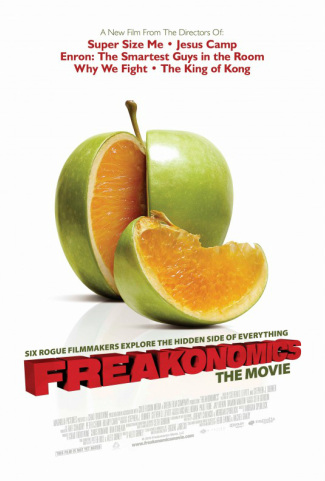 Tags: crime/law/deviance, demography/population, economic sociology, education, causality, correlation, incentives, preferences, rational choice theory, 61+ mins Year: 2010 Length: 93:00 Access: no online access, YouTube preview Summary: Freakonomics: The Movie is based on the 2004 best-selling book of the same name by journalist Stephen Dubner and economist Steven Levitt. The film is broken up into a number of short segments, all of which might be useful in a sociology course tackling rational choice theory or wrestling with the idea of causality. (1) "A Roshanda by Any Other Name" explores whether the name a child is given can be plausibly blamed for the child's successes or failures in life. (2) "Cheating" and (3) "Pure Corruption" examine how cheating in Chicago public schools and Japan's sumo wresting circuit can be explained by uncovering hidden incentives. (4) "Cause and Effect" succinctly and clearly illustrates the aphorism, "correlation is not causation." In (5) "It's Not Always a Wonderful Life," Steven Levitt offers a relatively detailed and multi-causal account of the drop in US crime rates beginning in the 1990s. According to Levitt, nearly half of the drop in crime can be explained by the unintended consequences of the Roe v. Wade decision by the United States Supreme Court. (6) "Incentives" explores how well intended incentives often lead people to act in unexpected ways, and finally, in (7) "Can a 9th Grader Be Bribed to Succeed?" we see Levitt and other researchers experiment with paying students cash incentives to improve their grades. Thanks to Jessie Daniels for suggesting this film. Submitted By: Lester Andrist
2 Comments
Manuel Franco
7/30/2023 05:47:45 pm
I just want to say Thank You to everyone who supported me through the years. My name is Manuel Franco, New Berlin, Wisconsin. My story of how I won the Powerball lottery of $768.4M is a bit of a tale. I have been playing Powerball tickets for 6 years now since I turned 18. I bought my first ticket on my 18 birthday. I was feeling very lucky that day because I had contacted Dr. Odunga Michael to help me with the winning Powerball numbers. I really had that great great feeling that I looked at the camera wanting to wink at it. I only did a tiny part of it and trusted him. He gave me the numbers after I played a couple other tickets along with it for $10. I checked my ticket after the winnings came online and saw the numbers were correct including the Power play. I screamed for about 10 minutes because it felt like a dream. I had won $768.4M. You can check my winning testimony with the lottery officials just with my name search. Thank you Dr Odunga. Well, his email is [email protected] and you can also call or Whats-app him at +2348167159012 so you guys can contact him
Reply
mark hold
7/8/2024 11:09:52 am
Herbal Penis Enlargement product is 100% guaranteed to Enlarge and get a better ERECTION, the reason why most people are finding it difficult to enlarge Penis is that they believe in medical reports, drugs and medical treatment which is not helpful for Penis Enlargement. Natural roots/herbs are the best remedies which can easily Enlarge your Penis permanently Contact Dr MOSES BUBA via Email: [email protected] or via WhatsApp: +2349060529305. for Natural root and herbal remedies put together to help Enlarge manhood and Erect healthily. I also learn that Dr MOSES BUBA also can cure other types of diseases, HEPATITIS B,DIABETICS,CANCER,HPV,LOW SPERM CAM, HIV/STDS, FIBROSIS LOST OF WEIGHT, BREAST ENLARGEMENT, HIPS and BUMS ENLARGEMENT etc .
Reply
Leave a Reply. |
Tags
All
.
Got any videos?
Are you finding useful videos for your classes? Do you have good videos you use in your own classes? Please consider submitting your videos here and helping us build our database!
|
 RSS Feed
RSS Feed
